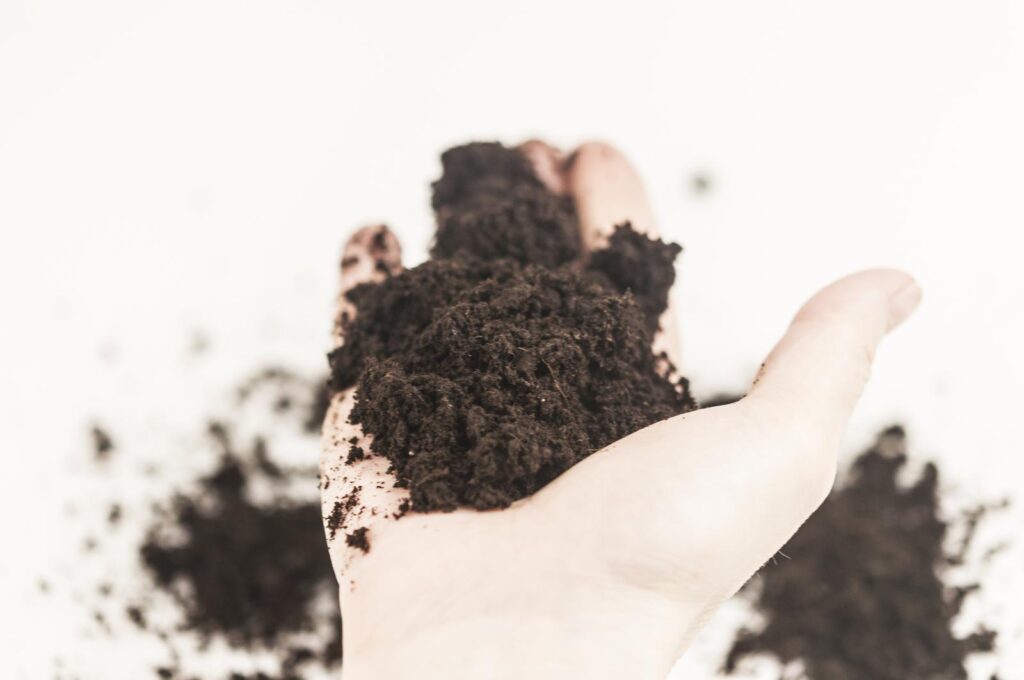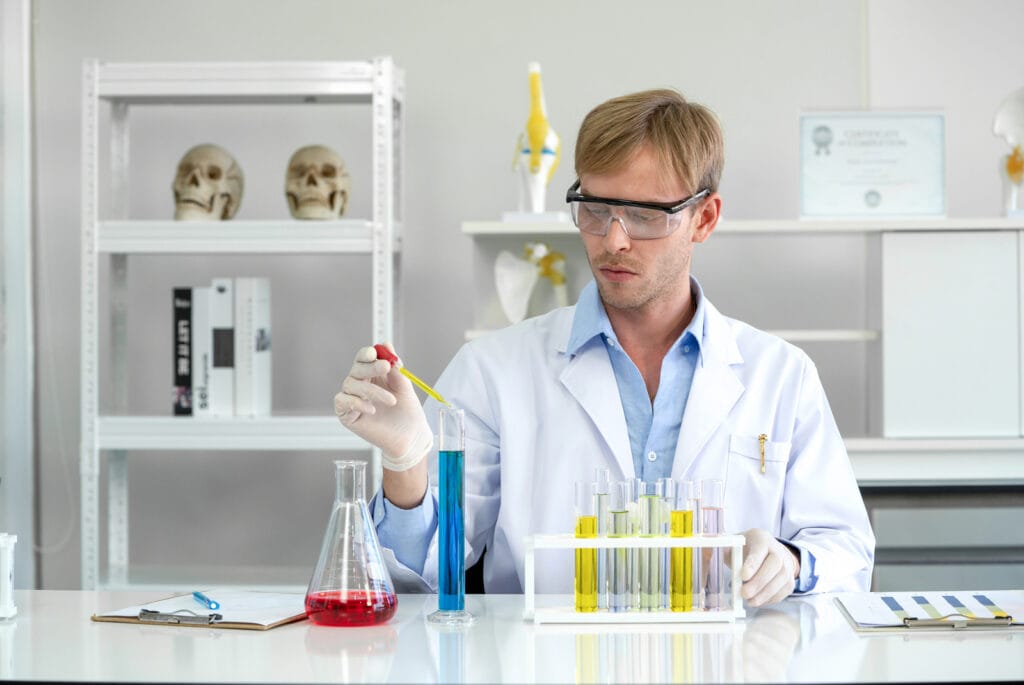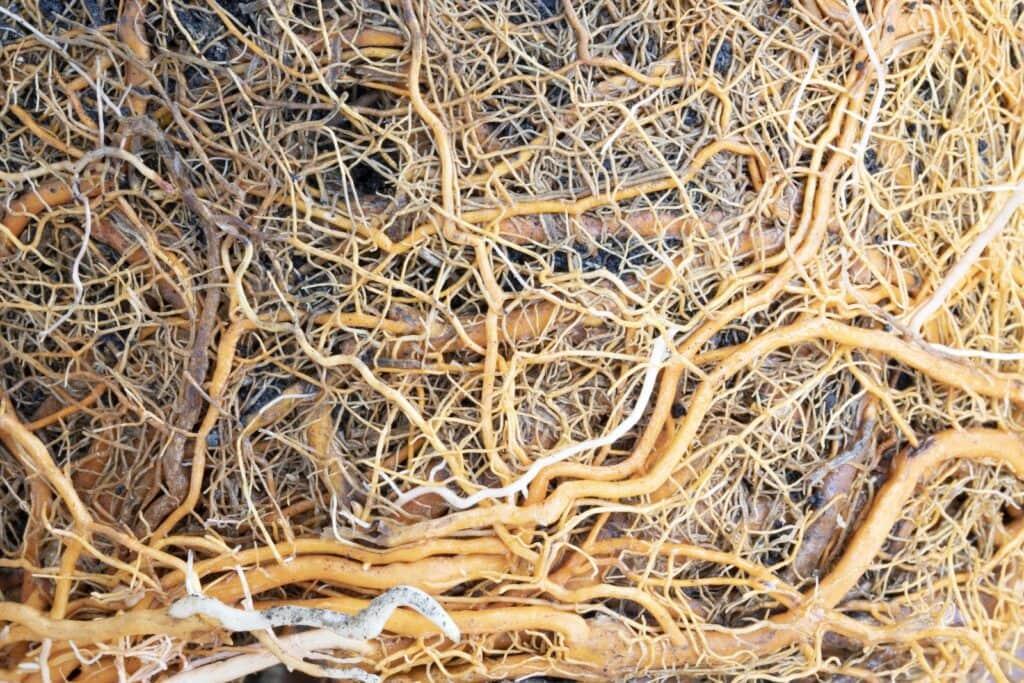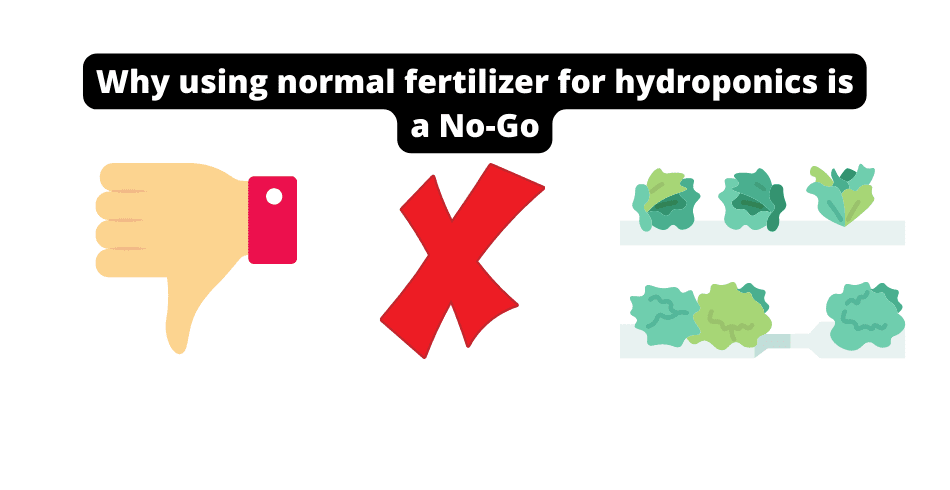People new to hydroponic farming might think it makes no sense to spend huge amounts on hydroponic-specific nutrients since there are so many cheap soil fertilizers on the market.
However, regular fertilizer is not ideal for use in a hydroponic system, and in this article, we’ll show you why.
Can you use normal fertilizer for a hydroponic plant?
Normal fertilizers can be used in hydroponics by some advanced-level maneuvering; however, this is not recommended.
When using normal fertilizers, several problems can arise due to the lack of essential components needed for plant growth, which can only be found in products manufactured specifically for hydroponic farming.
Normal fertilizers are not designed for hydroponic gardening and can damage your plants.
Many options are available to you, so be sure to pick one tailored to your respective growth system.
Here’s one of our favorites:
What Do Plants Need to Grow?
All plants need seven main things: light, air, water, the right temperature, nutrients, enough space to grow, and time.

Other things that can affect plant growth are the humidity in the air, the type of soil, and additives like fertilizer.
Why Do Plants Usually Need Fertilizer?
Traditional Farmers who want healthy crops must ensure that the soil is in good condition.
Each time crops are harvested, vital soil nutrients are lost.
And as nutrients in the soil are depleted, crop yields decline unless they are regularly replaced through fertilization.
Fertilizers help replace lost soil nutrients.
Nitrogen, potassium, and phosphorus are just a few nutrients that fertilizers add to the soil, which help in promoting increased plant growth and yield.
Why shouldn’t I use regular fertilizer for hydroponics?
Some hydroponic growers make the mistake of using regular fertilizer on their crops.
Normal fertilizers are designed to release their nutrients slowly over time; they need soil to keep the water and nutrients mixed.
If you use this fertilizer in a hydroponic system, the plant will be exposed to too many nutrients, potentially getting overloaded one nutrient at a time.

Since plants grown hydroponically get all their nutrients from the water, using regular fertilizers could cause the plant’s roots to burn because of the concentration of nutrients on the roots alone.
Hydroponic systems require certain organic nutrients that cannot be found in normal fertilizers.
What Are NPK Numbers?
NPK numbers, also known as the N-P-K ratio of fertilizer, are the proportions of nitrogen (N), phosphorus (P), and potassium (K).
All fertilizer products have these numbers, which can be seen in a prominent place on every label, either above or below the product name.
The NPK numbers indicate how much of each nutrient is in the product.
For example, if a pack of fertilizer has 4-3-2, it has 4% nitrogen, 3% phosphorus, and 2% potassium.
Check out this fertilizer below, where the NPK ration is listed in the title as 6-4-4
Knowing what NPK ratio works best for your system is important if you grow plants hydroponically.
You can use this information to pick the perfect fertilizer for your plants.
Using a fertilizer calculator, you can easily determine the ideal NPK ratios for your hydroponics setup.
Some of the best NPK ratios for hydroponics are:
- 7:9:5
- 3:2:1
- 9:27:6
Ultimately, your NPK dosage depends on how robust the nutrient solution is and how many plants are grown.
Since you’ll be cultivating various plants, you’ll need to adjust your NPK ratio accordingly.
Once you decide on a plant, the easiest thing to do is google the ratio you’re after.
What Factors Determine High-Quality Dry Hydroponic Nutrients?
Solubility, purity, stability, and nutrient blend are just a few factors to consider when shopping for a dry hydroponic nutrient.
To ensure your plants thrive and bloom wonderfully, it is crucial to consider the criteria mentioned above before making your final purchase.
Solubility
Many fertilizer manufacturers talk about how well their products dissolve, but this isn’t very meaningful if you don’t understand what they mean.
So, what is solubility?
When you mix dry nutrients with water, the goal is for the entire nutrient to dissolve into a single solution.
Solubility is the degree to which a substance can be dissolved in water.
If a nutrient is classified as “90% soluble,” 90% of the substance can be dissolved in water.
The solubility of nutrients depends on two key factors: the pH and the type of nutrient.
Depending on the situation, you might have to adjust the pH of your solution to get the best solubility levels and nutrient availability.
Don’t worry; this is a rather basic task.
However, to avoid purchasing a subpar product, it’s best to make an informed decision while selecting a product.
MaxiGro has always had great solubility for us, and the price point is incredible:
Purity
Just because a product has essential macronutrients like nitrogen, phosphate, and potassium does not mean that’s all it contains!
You should steer clear of products that have fillers and other unnecessary additives.
Nutrients should have low concentrations of heavy metals, be free of plant growth regulators (PGRs), and not include pesticides.

While avoiding them may seem like a no-brainer, many hydroponic nutrients have these ingredients.
So, it’s best to thoroughly examine any product’s labels before making a purchase.
Can I use soil nutrients in hydroponics?
Since soil fertilizers are designed to release nutrients into the soil slowly, they are most effective when applied to plants that grow in the ground.
By adding them directly to the water, you risk over-fertilizing your plants and causing them harm.
If you want to grow plants hydroponically, buying specific fertilizers designed for hydroponics is best instead of using the regular soil nutrients you find in stores.
Can you use Miracle-Gro fertilizer for hydroponics?
As we’ve mentioned, if you want the best results, you should use a nutrient solution for hydroponics.
Although Miracle-Gro can be used as a hydroponic fertilizer, it does not contain all the essential nutrients your plants need.
Some Miracle-Gro fertilizers don’t decompose quickly enough or provide all the necessary nutrients, so using them isn’t recommended.
For Example, on July 27, 2020 – The manufacturer of the water-soluble Miracle-Gro came out and said that this product is not intended for hydroponics.
If you decide to use Miracle-Gro for hydroponics (which we do not suggest), it’s best to stay away from the traditional types (soil-based) and dilute them.
The Problem with Using Hydroponic Nutrients in Soil
Using nutrients made for hydroponics for plants grown in soil is not a good idea, and this is because they are not designed as soil fertilizers and can cause salt to build up in the soil.

It’s important to note that while hydroponic nutrients and soil fertilizers provide plants with the nutrients they need, they are not designed to be interchanged.
How Do I Make a Hydroponic Nutrient Solution If I Can’t Use Regular Fertilizer?
There are two methods for preparing your hydroponic solution.
Your first option is to purchase premixed nutrients, while your second option combines the nutrients yourself.
While we personally buy the solutions pre-made with NPK ratios that we’re looking for, we know that many, because of the convenience and cost savings, opt to make their hydroponic solution home.
While we don’t suggest it… here’s how to prepare a hydroponic nutrient solution.
Choose the essential micronutrients.
Calcium nitrate, potassium nitrate, magnesium sulfate, and potassium sulfate are some key nutrients used in fertilizers.
Micronutrients, often known as trace elements, are needed in minimal quantities, and these elements affect how plants grow, reproduce, and respond to other nutrients.
Each of these nutrients and micronutrients has its own set of advantages.
And when put together, they all contribute to plant growth and well-being.
A plant’s genetic potential can be realized to its fullest with the help of micronutrients, which encourage the plant’s robust, consistent growth, leading to greater yields and improved harvest quality (More $$).
Their presence has significantly improved root growth, seed viability, fruit development, and overall plant vitality and health.
A lack of micronutrients can cause stunted growth, low yields, and even plant death.

Fill your water containers.
A typical hydroponic formula will require at least two reservoirs.
Make sure you use substantial containers and purified or distilled water if possible. Also, remember to check the temperature of your water.
Plants thrive in tepid conditions, which are neither too hot nor too cold.
The sweet spot for water temperature is anywhere between 65°F (18°C) and 68°F (20°C).
Make sure the pH is stable.
A pH meter can be used to ensure equilibrium.
The ideal range for a pH level is between 5.5 and 7.0.
The pH of your water directly affects how well your plants absorb nutrients.
If the pH is too high or too low, the nutrients won’t dissolve and will precipitate out.
Most nutrients become less available when pH levels are too high or too low.
Macronutrients and secondary nutrients are less available when the pH is low, and most micronutrients are less available when the pH is high.
Measure and mix your nutrients.
One reservoir tank should contain crop-specific fertilizers like potassium nitrate or certain micronutrients, while the other should hold water.
When adding the nutrients, do it slowly and carefully to avoid spills or overflows.
Once you’re done, your nutrient solution is ready to go!
Other Articles
Ready to jump in with your hydroponic garden and start growing some REAL PLANTS?
Check out
- Best Hydroponics System For Vegetables
- Best Hydroponics System for Strawberries
- Best Hydroponics System For Lettuce
Final Thoughts & Recap
Don’t use regular fertilizer for your hydroponic garden, even if you have any lying around the shed.
It is not worth the risk to use random fertilizers on plants that are growing in water, as they can be harmful to your crops.
There are various types of fertilizer available, and you should choose the one best suited to your needs and hydroponics system.
- Why Is My Gardenia Turning Yellow? [Discover the Surprising Causes] - January 1, 2024
- Why Hydroponics Is Bad [Discover the Hidden Risks] - January 1, 2024
- Why Do Gardenia Leaves Turn Yellow [Prevent This Common Mistake] - January 1, 2024
